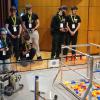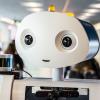Robotics for Good Youth Challenge
The Robotics for Good Youth Challenge is an initiative launched by the UN in the context of growing climate challenges and increasingly frequent and intense natural disasters. Global climate change increases the risks and intensity of disasters such as torrential rains, landslides, flash floods, earthquakes, hurricanes and forest fires. In response to these emergencies, using robots for search and rescue operations is proving particularly effective.
Autonomous robots offer a quick and accurate response to finding survivors, which is crucial when every minute counts. By reducing the exposure of first responders to hazardous situations, these machines make disaster relief safer, more efficient and more affordable. In addition, robots have the advantage of being carbon neutral, which is part of a sustainable approach. They can speed up search and rescue operations, conduct geological mapping, assess damage, remove rubble and deliver medical supplies, among other tasks.
Why is this a good practice?
In this context, the Robotics for Good Youth Challenge invites teams from worldwide to design, build and code robots to address specific challenges related to disaster response for the year 2024-2025. Participants can use platforms such as Arduino, Raspberry Pi, or LEGO Mindstorms. The process includes research, brainstorming, prototyping, and programming. This educational competition aims to promote robotics and programming skills among young people, while raising awareness of the United Nations Sustainable Development Goals (SDGs). Participants acquire technical knowledge in robotics and coding, while developing essential skills for their professional and future lives, such as teamwork, problem solving, project management, critical thinking and information retrieval.
How can I participate in this initiative?
Contest participants can register in person if a national organiser is present in their country or region. In the absence of a physical event, they have the opportunity to individually prepare their project and submit their results as a video for evaluation by a jury. In Luxembourg, this challenge is organised by the Lëtzebuerger Kannerduerf Foundation in Luxembourg. Private and public entities are encouraged to organise national events for this challenge between April 2024 and April 2025, with applications for the organisation to be submitted before 1 June 2024, and participant registrations open until 1 November 2024. Participants, usually between the ages of 12 and 18, register individually or as part of a team. Each team is encouraged to be composed of members with diverse interests and skills for a multidisciplinary approach.
The competition promotes inclusion by making learning robotics and coding accessible to all, regardless of gender, socio-economic status or academic abilities. It also encourages the use of recycled materials and environmentally friendly solutions, with a focus on the development of sustainable robots.
How the Challenge works
After registration and conniassance of the theme chosen for the edition, the challenge takes place in several stages
- Mentoring and workshops: Participants benefit from mentoring sessions with robotics and engineering experts. Workshops are organized to teach specific technical skills and guide the teams in the development of their projects.
- Presentations and evaluations: Teams present their projects to a jury of technology and sustainability experts. The evaluation criteria shall include innovation, feasibility, social and environmental impact, presentation and teamwork.
- Award ceremony: The best teams are rewarded at an awards ceremony. Winners may receive scholarships, funding to further develop their projects, or opportunities for continuous mentoring.
Old edition
In one of the last editions, for example, the theme was ‘Technology for Health and Well-being’, a topic relevant in the current context of the COVID-19 pandemic. Projects featured included robots to help older people stay active at home, automated disinfection systems, and solutions to improve mental health through technology.



